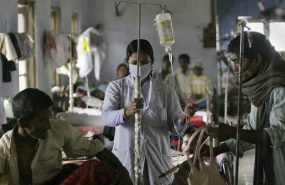Community, Rights and Gender Strategic Initiative Final Evaluation (2017-2019)
- 21.07.2020 09:39
- Post Views: 801
The 2017-2019 CRG Strategic Initiative has achieved remarkable growth and maturation, expanding its remit across the grant cycle and solidly into malaria and TB, expanding geographic reach, and building a complex supportive relationship between Components 1 and 3 in building demand for and delivering TA. This report offers 35 unique recommendations for its further improvement. This volume of recommendations is provided not as a reflection of the weakness or flaws of this Strategic Initiative, but quite the opposite – as evidence of the potential for further strengthening and achievement that is underpinned by a history of consistent learning and evolution since the beginning of the Special Initiative in 2014… This leaves the CRG Strategic initiative ideally positioned to support meaningful engagement of key and vulnerable populations and networks in Global Fund-related processes as it moves into its next phase.
Some key achievements captured by the evaluation include:
- 159 eligible technical assistance (TA) requests received, a 145% increase over the 65 eligible requests in the CRG Special Initiative (2014-2016).
- TA provided in 69 countries across 6 regions, an 188% increase from the 24 countries under the CRG Special Initiative (2014-2016).
- Ten TA missions addressed multi-country grants, including three in South East Asia, 3 in LAC, 2 in MENA, 1 in EECA, and 1 in Eastern and Southern Africa.
- 17 TA missions were delivered in countries that are classified as challenging operating environments (COEs).
- HIV KP networks implemented activities in 66 countries across all 6 continents where the Global Fund invests.
- TB community organizations implemented activities in 19 countries in Anglophone Africa, LAC, EECA and Southeast Asia regions, all countries with high TB burden and high number of missing people with TB (alignment with TB FMP-SI).
- Malaria CSOs and impacted communities implemented activities in 8 countries in West, Central and Eastern Africa with high malaria burden.
- More than 60% of TA demand came via the Regional Platforms, with 100 out of 159 TA requests either generated, guided, or reviewed by the Regional Platforms before submission to the Global Fund.
- Two joint Regional Platform case studies were published, the first focusing on the value-add of creating spaces for in-person peer learning and exchange, and the second on enhancing community knowledge through information sharing.
- Email newsletter reach has increased by 16% , from 7,367 subscribers in May 2018, to 8,570 in December 2019.
- Engagement with Platform content (e.g. clicks) is 3.5 times higher than the industry average.
- HER Voice Fund pilot awarded 183 grants to support AGYW engagement in Global Fund related processes.
- Partnership secured with ViiV Positive Action to support continuation of HER Voice Fund.
- Malaria Equity Assessment Tool (Malaria Matchbox) developed and implemented to assess which populations are most impacted by malaria, and to ensure that core malaria interventions are equitable and designed to leave no one behind
Community, Rights and Gender Strategic Initiative 2017-2019: Independent Evaluation.
Community Rights and Gender Strategic Initiative Final Evaluation.
Related News
Global Fund Strategy Development – Open Consultation Questions
COVID-19 is radically altering global health, politics and economics, and the impact upon programs fighting HIV, TB and malaria will likely be tremendous. The new pandemic could completely derail our vast efforts of the past 20 years. At the same time, it has galvanized public awareness on global health security in a way that builds […] Read moreGlobal Fund Technical Brief Tuberculosis, Gender and Human Rights
The purpose of this technical brief is: to assist Global Fund applicants to consider how to include programs to remove human rights and gender-related barriers to tuberculosis prevention, diagnosis and treatment services within funding requests, and to help all stakeholders ensure that TB programs promote and protect human rights and gender equality. Post Views: 934 Read moreGlobal Fund Technical brief on HIV and key populations Programming at scale with sex workers, men who have sex with men, transgender people, people who inject drugs, and people in prison and other closed settings
The purpose of this technical brief is to provide information for countries preparing funding requests for comprehensive programs that address the cascade of HIV prevention, diagnosis, treatment, and care for the following key populations: male, female, and transgender sex workers, gay men and other men who have sex with men, transgender people (especially transgender women), […] Read moreServices for migrants and refugees from Ukraine – HIV/TB care with a focus on key populations
Due to the increasing flows of refugees from Ukraine because of Russia’s invasion of Ukraine, the EECA Regional Platform created a spreadsheet to fill contacts details of face-to-face and online services for refugees and migrants (with a focus on HIV/TB care and key population groups).
Regional Platform – EECA
This web-resource is a part of new regional communication and coordination project “Regional Civil Society and Community Support, Coordination and Communication Platform - EECA”, implemented by Eurasian Harm Reduction Association (EHRA).
Tags
See also
-
EECA’s Regional Platform monthly Newsletter #20, January 2026 27.01.2026 12:58
-
Global Fund Eligibility List 2026 27.01.2026 11:19







